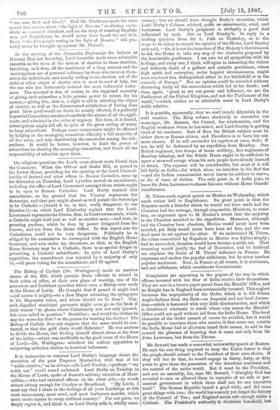It is instructive to contrast Lord Derby's language about the
execution of the poor Emperor Maximilian with that of his " noble relative," as he always calls Lord Stanley,—perhaps " my noble son" would sound awkward. Lord Derby on Tuesday, in the House of Lords, spoke of Juarez's military execution of Maxi- milian,—who had executed officers on the other side,—in words almost strong enough for Crookes or Broadhead. " My Lords, I must say that I share in the feelings of all your Lordships at this most unnecessary, most cruel, and most barbarous murder, which must excite horror in every civilized country." For our parts, we deeply regret it, and think it, as Lord Derby calls it, wholly wane-
influenced by rank. Not so Lord Stanley's. In reply to a leading question from Sir L. Palk on Thursday, as to the steps to be taken to record the opinion of the House, Lord Stanley only said, " Sir, it is not the intention of Her Majesty's Government to ask the House to take any step of the character proposed by the honourable gentleman. I am sure we all sympathize with his feelings, and every one, I think, will agree in lamenting the violent and untimely death of a gallant and amiable gentleman, whose high spirit and enterprise, under happier circumstances, might have rendered him distinguished either in V_te battlefield or in the councils of Europe." But, no opinion could be recorded without discussing fairly all the antecedents which led to his death ; and then, again, "great as are our power and influence, we are the Parliament of the United Kingdom, and not the Parliament of the world,"—which strikes us as admirable sense in Lord Derby's noble relative. " our own flesh and blood." Had Mr. Gladstone made the same cessary; but we should have thought Burke's execution, which speech last session about "the light of Heaven," as shining exclu- I Lord Derby's Cabinet advised, quite as unnecessary, cruel, and sively on contested elections:, and on the duty of trusting-English- barbarous. Lord Derby's judgment is evidently a good deal men quit Englishmen, he would never have heard the end of it Even " the free people voting in the light of Heaven " will pro- bably never be brought up against Mr. Disraeli.






























 Previous page
Previous page